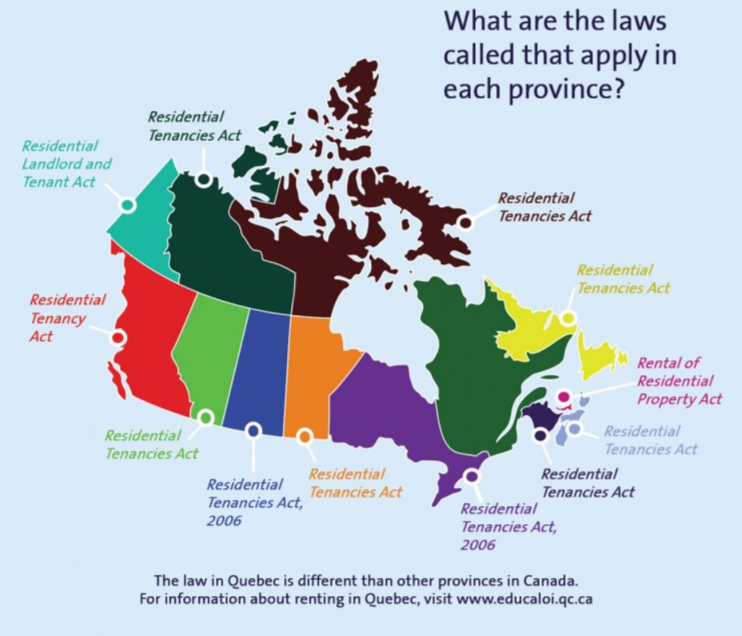Property rental laws in Canada vary across different provinces. Those involved in renting a property need to be aware of the relevant landlord/tenant legislation that applies in their locality.
It is important to ensure you are knowledgeable about the relevant laws and have a lease agreement that is fully compliant with local laws and are aware of the laws governing security deposits, fixes and protection, and eviction for landlords.
The origin of the differing laws relates to Canada’s Constitution Act 1867, where the legislators determined the various areas of control from the federal government and the provincial legislators. Who would control which area?
Property laws are a ‘provincial concern’, which lead to the differing laws relating to each province.
The various laws applicable to different provinces can be seen below –

Landlord tenant matters are not as straightforward as other legal affairs and an accurate knowledge of the laws – in this case in Toronto – is important. Having the right lawyer is a good start, being one that is well versed in landlord/tenant law for Ontario, which is governed by the Residential Tenancy Act 2006. (RTA).
; one must choose the right lawyer. Keeping in view the sensitivity of property matters, landlord tenant law is a unique facet of real estate law. Moreover, laws are country-specific.
If you need to deal with a land matter in Toronto, you must consult Toronto Landlord Tenant Lawyer.
Importance of Landlord Tenant Law:
Landlord tenant law is a specialized branch of real estate law. Landlord tenant lawyers specialize in the relationship between property owners (landlords) and tenants (renters).
They frequently draught leases for landlords or, on the other hand, may assist tenants in obtaining a security deposit from a landlord.
In Ontario, the RTA provides landlords with certain rights when choosing a tenant for a property rental situation, which including the ability to use income information, credit checks, credit references, rental history, guarantees, and similar business practices as prescribed in the province’s Ontario Human Rights Code regulations.
It is always important to ensure – as landlord or tenant – and hire a Toronto Landlord Tenant Lawyer to ensure that you comply with all necessary provincial and local laws and regulations. No landlord, for instance, can refuse a tenant based on racial, ethical, religious, sexual, age, marital or family status or disability.
Responsibility of a Landlord:
Following are the responsibility of a Landlord:
- To keep the residency’s structure and exterior in good condition.
- To ensure that all installations, like gas, electricity, and heating, are operational.
- To keep Installation, as well as appliances safe and functional. Please keep in mind only applies to appliances owned by the landlord.
- Treat conditions that could be harmful to your health, such as growing damp.
- To ensure that both parties are following all agreements.
- Anything else that the tenancy agreement specifies.
What Skills A Landlord Tenant Lawyer Must Own?
A good landlord-tenant lawyer should be well acquainted with the relevant laws and regulations, but should also have other skills that any client would require of them, particularly in an area that has become increasingly the focus of interest by local authorities and other who need to ensure there is full compliance by both landlord and tenant when it comes to property issues.
Among the key factors any client should seek are –
- Communication Skill:
The most basic and most important skill for a lawyer is communication skills where the law can be clearly and comprehensively explained. A lot of legal work revolves around dealing with clients through writing and overall good communication, including the obvious requirement of drafting a compliant lease agreement.
- Decision-making skills:
He must have the ability to consider and weigh the consequences and benefits of potential actions and then take the right decision when it comes to tenancy matters and any other issue affecting the lease or tenancy agreement.
- Emotional Intelligence:
Emotional intelligence provides any lawyer with the ability to empathize with clients and to deal with tenancy and other issues that arise without the need to involve legal action, mediation or any other process that can lead to expense and stress.
The Bottom Line & Additional Resources:
A number of resources are available for those involved in the Ontario (including Toronto) landlord-tenant issues including the following –
- Landlord’s Self-Help Centre – A community legal clinic offering details and advice to landlords.
- Navigate Tribunals Ontario – This is an online tool from the Landlord and Tenant Board to search for resources outlining the various responsibilities and rights and to see the rules outlined by the Landlord & Tenant Board (see below).
- Landlord and Tenant Board – The tribunal providing information about the Residential Tenancies Act (RTA) and resolves disputes between most residential landlords and tenants.
- CLEO – Housing Law – This is the clear language publication on the rights of tenants in rental housing and produced by the Community Legal Education Ontario (CLEO).
- Human Rights in Housing – Information for landlords about human rights in relation to housing and accommodating tenants’ needs produced by the Ontario Human Rights Comission (OHRC).
Source: Horlick, Levitt, DeLella Law
